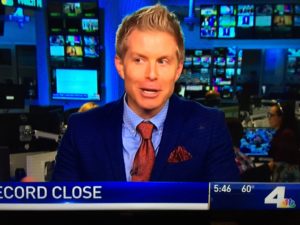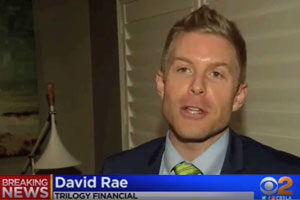
Fiduciary Rule for Financial Advisor Changes and How to Protect Your Bottom Line with video from ABC News. While Trump has signed an executive order to attempt to rollback the Fiduciary Rule, it went into effect Friday, June 9th. Will the Fiduciary rule help or pick the pockets of hard-working Americans?
What will this mean for the millions of Americans who hold TRILLIONS of dollars in retirement accounts? What actions should you take now to make sure you are getting unbiased advice that is in your best interest? Is your financial planning guide a Real Fiduciary? It is estimated that just 5000 advisors are Fiduciaries who are legally required to follow 100% of the time. So, you are likely not to get true fiduciary financial planning advice 100% of the time.
By David Rae Certified Financial Planner™, Accredited Investment Fiduciary™
Updated: We have entered the grace period for the Fiduciary Rule Implementation on July 1st, 2019. From the original implementation date of January 1st, 2018. But you can still get Real Fiduciary Advice Now. As of 11/25/2021, the fiduciary rule still has not been implemented. This allows many so-called financial advisors to work under the lower suitability standard.
After years of work, the Department of Labor (DOL) finally unveiled its Fiduciary Rule last spring. It was delayed but eventually went into effect Friday, June 9th this year. We are in the grace period until January 1st, 2018. By law, it would mean that “Financial Advisors” (i.e., financial planners, stockbrokers, registered reps, attorneys, banks, lenders, investment hucksters, etc.) must act in their clients’ best interests and not their own when dealing with retirement accounts only. They still have free reign on your other investment accounts.
Given our country’s recent economic history, this was long overdue. Granted, before its passing, Wall Street lobbyists were paid millions to kill the bill. This could lead one to surmise that putting the consumers’ best interests first would be bad for their profits. But really, as an individual, it was a no-brainer to see Fiduciary Financial Advice. Personally, as a Los Angeles Certified Financial Planner for nearly two decades, I just think working in a Fiduciary Capacity and putting my clients first is just good business. Besides, who could argue against a policy that speaks to both ethics and common sense? Yes, well, Donald Trump is who.
Speculation of More Delays to the Fiduciary Rule?
While many old school financial professionals – who had been doing things the same way for decades were hoping (and widespread speculation in the industry and mainstream press) that the White House would direct a delay of the Rule. Trump’s memorandum does not provide directly for such a delay. It does, however, direct the DOL to publish for notice and comment a proposed rule rescinding or revising the Fiduciary Duty Rule. That being said, it is going into effect on Friday, June 9th.
David Rae, Financial Planner LA, appeared on the ABC 7 Eyewitness News with Ellen Leyva and Coleen Sullivan to discuss the Fiduciary rule delay back in February.
The Fiduciary Rule Has Been Delayed By Donald Trump
But whether by calculation or ignorance, the actual full repeal of the Fiduciary Rule hasn’t happened yet. Therefore, despite Donald Trump’s ‘delay’ of the Fiduciary Rule, as of this date and time, the Friday, June 9th applicability date still stands. As such, I’m still prepping a full implementation as scheduled. (I myself have been an Accredited Investment Fiduciary™ for years, but new regulations have increased the recordkeeping requirements for all financial planners to comply with the law.)
Our phones have been ringing off the hook from investors, News outlets and retirement savers with questions on this important issue. Here are the big ones:
How do I know if my ‘financial person’ is a real Fiduciary?
Those of us who are Fiduciaries are pretty proud of it and usually display the title prominently on our business cards and websites. But if you’re not sure, just ask. If your person is a Fiduciary –the answer should be a simple yes. But if they aren’t actually a Fiduciary, they may try and give you some convoluted justification of why they don’t want to work in your best interests. HEAR ME NOW: if the person handling your investments is not a Fiduciary, RUN, and run fast.
Professional designations are a good guide, too. Look for individuals with Certified Financial Planner™ or Accredited Investment Fiduciary™ after their names. Also, look for people who work with a Registered Investment Advisor (RIA) rather than a fund company or big-name brokerage house blasting commercials on late-night TV. Who do you think is paying for all those expensive advertisements – ultimately, it is you, the investor.
Are they a Real Fiduciary 100% of the time?
If they are a fiduciary 100% of the time, they are most likely working for a Registered Investment Advisor (RIA) versus a Broker-Dealer or Wirehouse. According to the Wall Street Journal, “of the roughly 310,000 financial advisors in the U.S., less than 10% are legally obligated to put your interests first at ALL times on ALL of your accounts!” To put it more bluntly, over 90% of the advisors out there are not real fiduciaries but simply salespeople in disguise.
Where does the Fiduciary Rule stand now?
Implementation of the law has been delayed, but the law won’t go away. We entered the grace period now that the rule went into effect on Friday, June 9th. Much of the industry has already made adjustments and incorporated the Fiduciary Rule into their policies to their customers’ benefit. Those who haven’t – because, as yet, it’s not an enforceable law – may seek to profit from the confusion by implying fiduciary actions but without actually living up to the standard. Others will continue as part-time fiduciaries, putting the client first only when required by law.
You can still get Fiduciary Financial advice whether the actual “Fiduciary Rule” Law is ever implemented. The Fiduciary Standard and advice have been around for years. Many people didn’t even think to ask if their adviser was putting their interest first or working as a fiduciary financial planner, for that matter.
What does the Fiduciary Rule mean for retirement savers and their investments?
The Obama administration said that unscrupulous or conflicted advice costs American savers $17 billion a year. This lowers annual returns by around 1% per annum or so. Proponents of the Fiduciary Rule – and count me as one – say it would help eliminate many of the conflicts of interest and incentives that lead financial advisers to peddle heavily conflicted advice.
Others decry the lost revenue for the industry and claim that it will limit the availability of financial advice for the smallest investors. Closer to the truth, this will make sky-high commissions hard to come by for desperate salespeople. I personally would hope that you would get more value for whatever cost and expenses you are incurring to get financial or investment advice.
The bottom line is that the Fiduciary Rule would benefit investors and make fees/costs/expenses more transparent. Investors would be able to make more informed decisions and get more ongoing financial planning advice. The old-school transactional buying and selling of investments with no real goal or purpose has not worked for people.
What happens if the Fiduciary Rule is delayed again or killed?
It’s not likely that the rule – or at least the thinking behind it – will be going anywhere anytime soon. That genie is already out of the bottle. Even if the Department of Labor’s Fiduciary Rule is formally repealed, the Fiduciary Standard is here to stay at some level. As I noted earlier, many firms have made adjustments to their policies and fee structures. And the number of fiduciary financial advisors like myself who have voluntarily started working to the Fiduciary Standard has grown exponentially.
On our end, this generally means instead of working on commissions, we charge a fee for financial planning advice and a percentage of assets for managing investments. I’ve spoken with some older advisors who are stubborn and don’t want to change what they have been doing for 30+ years. But as an investor or saver, if given the choice, why would you knowingly work with a financial expert who doesn’t keep up to date on current policies and doesn’t have your best interest at heart?
How can investors protect themselves with or without the Fiduciary Rule?
- Only entrust your money to a Fiduciary Financial Planner. Period.
- Ask your financial advisor professional to sign a Fiduciary Oath.
- Beware of anyone who puts a BIC (Best Interest Contract). Or BICE (Best Interest Contract Exemption) in front of you without a good explanation.
- Look for credentials like Certified Financial Planner™ (CFP®) or Accredited Investment Fiduciary™ (AIF®)
- Ask if the advisor is affiliated with a Broker Dealer or Wirehouse. (the ideal answer is NO).
- A fiduciary financial advisor or not, make sure your financial decisions are made as part of a comprehensive financial plan.
- Look for Fiduciary Financial Advice on all accounts, not just your retirement accounts.
I’m not trying to scare anyone here (well, OK, I am a little.) The old suitability standard could be better than nothing, to be sure. It’s kind of like the old flip phones; they were great at the time. But now they’re as antediluvian as a Model T, and it’s more practical to have an app-intensive iPhone. When you know you can get Fiduciary advice, why would you settle for anything less?
Why I chose to be a Fiduciary long before the Fiduciary Rule
I’ll end on a personal note. As a long-time Fiduciary Financial Planner (I became a Certified Financial Planner in January 2006), I feel putting my client’s best interest is just smart business. It may mean a little less money in my pocket now, but I’m building long-term relationships with my customers, and I truly want to see them achieve financial independence. Sure, without regulation, there’s the allure of getting a big commission before running off to hunt the next elephant. But that kind of thinking and that kind of greed pulled a worldwide catastrophe down on our heads. Today, I just don’t see it as a great business-building strategy or a way to help my clients in the long term.
Setting up a secure retirement and getting your financial house in order to start working with professionals who are on your side. Whether it’s legally mandated (as of the implementation of the Fiduciary Rule) or merely smart business doesn’t matter. What matters is you pay attention and only work with those who have your best interests at heart. If you are looking for a Fiduciary Financial Planner the good news is our numbers are growing. The bad news is that there is still not enough of us to adequately serve each and every American on their path to financial independence. Those of us who do a good job for our clients can’t keep up with the referrals to people asking for fiduciary financial advice.
Live for Today, Plan for Tomorrow. Your Money Matters. Might as well get the Best Financial Advice.
DAVID RAE, CFP®, AIF® is a Los Angeles-based retirement planning specialist with DRM Wealth Management as a Registered Investment Advisor. He has been helping friends of the LGBT community reach their financial goals for over a decade. He is a regular contributor to the Advocate Magazine, Forbes.com, Investopedia and Huffington Post as well as the author of the Financial Planner Los Angeles Blog. Follow him on Facebook or via his website, www.davidraefp.com

You may also enjoy:
The opinions voiced in this article are for general information only. Make sure to work with a Fiduciary Financial Advisor to get advice for your specific goals.










[…] Fiduciary Rule Changes Comment and VIDEO […]
[…] based on your own personal financial goals, time frames and tolerance for risk. Working with a fiduciary Certified Financial Planner™ to put together a financial road map that includes stocks can help set the path to your financial […]
[…] Look for an Fiduciary Financial Advisor who will tell you what don’t want to hear. The financial adviser you should choose is not there to […]
[…] for my business. Indeed, providing a safe haven for my LGBT brothers and sisters seeking sound fiduciary financial advice has turned into a substantial part of my livelihood, thank you very much. For the record, my client […]
[…] a fiduciary Certified Financial Planner™ and/or Accredited Investment Fiduciary™ – that is, professionals who are legally bound to put their clients’ best interests ahead of […]
[…] for my business. Indeed, providing a safe haven for my LGBT brothers and sisters seeking sound fiduciary financial advice has turned into a substantial part of my livelihood, thank you very much. For the record, my client […]
[…] not business, finance or even economics btw – had a theory that if you hire (pay) a professional fiduciary financial planner you will end up with less money than it didn’t hire said financial planner, all other things […]
[…] DR: If people held mutual funds for 25 years, this argument might make sense. Sadly, the average person only holds a mutual fund for about 3.30 years, according to Dalbar. That puts the commission closer to 1.74% percent per year. This also totally ignores the ongoing hidden fees going to the broker and the ongoing mutual fees, which can easily add another 2% per year to the cost of owning an expensive mutual fund. If you are getting fiduciary investment advice, you won’t be paying any upfront commissions. […]
[…] DR: If people held mutual funds for 25 years, this argument might make sense. Sadly, the average person only holds a mutual fund for about 3.30 years, according to Dalbar. That puts the commission closer to 1.74% percent per year. This also totally ignores the ongoing hidden fees going to the broker and the ongoing mutual fees, which can easily add another 2% per year to the cost of owning an expensive mutual fund. If you are getting fiduciary investment advice, you won’t be paying any upfront commissions. […]
[…] DR: If people held mutual funds for 25 years, this argument might make sense. Sadly, the average person only holds a mutual fund for about 3.30 years, according to Dalbar. That puts the commission closer to 1.74% percent per year. This also totally ignores the ongoing hidden fees going to the broker and the ongoing mutual fees, which can easily add another 2% per year to the cost of owning an expensive mutual fund. If you are getting fiduciary investment advice, you won’t be paying any upfront commissions. […]
[…] DR: If people held mutual funds for 25 years, this argument might make sense. Sadly, the average person only holds a mutual fund for about 3.30 years, according to Dalbar. That puts the commission closer to 1.74% percent per year. This also totally ignores the ongoing hidden fees going to the broker and the ongoing mutual fees, which can easily add another 2% per year to the cost of owning an expensive mutual fund. If you are getting fiduciary investment advice, you won’t be paying any upfront commissions. […]
[…] DR: If people held mutual funds for 25 years, this argument might make sense. Sadly, the average person only holds a mutual fund for about 3.30 years, according to Dalbar. That puts the commission closer to 1.74% percent per year. This also totally ignores the ongoing hidden fees going to the broker and the ongoing mutual fees, which can easily add another 2% per year to the cost of owning an expensive mutual fund. If you are getting fiduciary investment advice, you won’t be paying any upfront commissions. […]
[…] Work with your fiduciary financial planner to develop a retirement income plan that you can’t …, and make sure that plan includes the optimal age to claim Social Security for your personal situation. If your so-called financial adviser isn’t willing or able to help, find someone who can. You worked 40+ years for this benefit and deserve nothing less than the maximum Social Security benefits you are entitled to receive. […]
[…] representative are paid under this statute. Thus, if both the attorney and the executor elect to receive a fee, the amount paid will be double that shown below. This can be an important point about […]
[…] positive aspects can keep away from an enormous tax shock when submitting your taxes. Work with a fiduciary financial planner to develop a roadmap to reaching your varied monetary objectives whereas minimizing taxes alongside […]
[…] your financial advisor likely is not a fiduciary. Those of us who are Fiduciaries are pretty proud of it and usually display the title prominently on our business cards and […]
[…] to receive an inheritance from someone who lived in a state other than California, talk with your fiduciary financial planner to check their estate tax […]
[…] receive an inheritance from someone who lived in a state other than California, talk with your fiduciary financial planner to check the estate tax laws affecting your inheritance there. No California estate tax means […]
[…] is not adequately advising clients about the best Social Security claiming strategies. As a fiduciary financial planner, I feel Social Security guidance should be a part of every retirement plan. A majority of the […]
[…] is not adequately advising clients about the best Social Security claiming strategies. As a fiduciary financial planner, I feel Social Security guidance should be a part of every retirement plan. A majority of the […]
[…] is not adequately advising clients about the best Social Security claiming strategies. As a fiduciary financial planner, I feel Social Security guidance should be a part of every retirement plan. A majority of the […]
[…] a plan to maximize the value of your Social Security retirement benefits. Get the help of a trusted fiduciary financial planner to avoid the various mistakes people make when managing their Social Security benefits themselves. […]
[…] a plan to maximize the value of your Social Security retirement benefits. Get the help of a trusted fiduciary financial planner to avoid the various mistakes people make when managing their Social Security benefits themselves. […]
[…] a plan to maximize the value of your Social Security retirement benefits. Get the help of a trusted fiduciary financial planner to avoid the various mistakes people make when managing their Social Security benefits themselves. […]
[…] a plan to maximize the value of your Social Security retirement benefits. Get the help of a trusted fiduciary financial planner to avoid the various mistakes people make when managing their Social Security benefits themselves. […]
[…] a plan to maximize the value of your Social Security retirement benefits. Get the help of a trusted fiduciary financial planner to avoid the various mistakes people make when managing their Social Security benefits themselves. […]
[…] is not adequately advising clients on the best strategies for claiming Social Security. Like a fiduciary financial plannerI believe that Social Security counseling should be a part of any retirement plan. A majority of […]
[…] with your fiduciary financial planner and tax pro to make sure you are being proactive with your tax planning. The higher your income, […]
[…] an examination of the intrinsic value of Apple stock or the company’s future. But rather a fiduciary financial planning conversation I’ve had with actual clients (names and details changed to shield their […]
[…] are tired of worrying about the day-to-day volatility of the stock market, consider working with a fiduciary fee-only certified financial planner who specializes in working with people like […]
[…] are tired of worrying about the day-to-day volatility of the stock market, consider working with a fiduciary fee-only certified financial planner who specializes in working with people like […]
[…] are tired of worrying about the day-to-day volatility of the stock market, consider working with a fiduciary fee-only certified financial planner who specializes in working with people like […]
[…] are tired of worrying about the day-to-day volatility of the stock market, consider working with a fiduciary fee-only certified financial planner who specializes in working with people like […]
[…] are tired of worrying about the day-to-day volatility of the stock market, consider working with a fiduciary fee-only certified financial planner who specializes in working with people like […]
[…] are tired of worrying about the day-to-day volatility of the stock market, consider working with a fiduciary fee-only certified financial planner who specializes in working with people like […]
[…] are tired of worrying about the day-to-day volatility of the stock market, consider working with a fiduciary fee-only certified financial planner who specializes in working with people like […]
[…] are tired of worrying about the day-to-day volatility of the stock market, consider working with a fiduciary fee-only certified financial planner who specializes in working with people like […]
[…] are tired of worrying about the day-to-day volatility of the stock market, consider working with a fiduciary fee-only certified financial planner who specializes in working with people like […]
[…] are tired of worrying about the day-to-day volatility of the stock market, consider working with a fiduciary fee-only certified financial planner who specializes in working with people like […]
[…] are tired of worrying about the day-to-day volatility of the stock market, consider working with a fiduciary fee-only certified financial planner who specializes in working with people like […]
[…] are tired of worrying about the day-to-day volatility of the stock market, consider working with a fiduciary fee-only certified financial planner who specializes in working with people like […]
[…] the other hand, if you are starting to invest for retirement at a late age, work with your CPA and fiduciary financial planner on a smart withdrawal strategy so you can potentially avoid unwanted taxation on your Roth IRA […]
[…] the other hand, if you are starting to invest for retirement at a late age, work with your CPA and fiduciary financial planner on a smart withdrawal strategy so you can potentially avoid unwanted taxation on your Roth IRA […]
[…] to their clients. If you ask me, ignoring this valuable tax planning strategy is a breach of their fiduciary duty. Why would a business want to know about a tax planning strategy that both helps them reach […]
[…] the other hand, if you are starting to invest for retirement at a late age, work with your CPA and fiduciary financial planner on a smart withdrawal strategy so you can potentially avoid unwanted taxation on your Roth IRA […]
[…] the other hand, if you are starting to invest for retirement at a late age, work with your CPA and fiduciary financial planner on a smart withdrawal strategy so you can potentially avoid unwanted taxation on your Roth IRA […]
[…] the other hand, if you are starting to invest for retirement at a late age, work with your CPA and fiduciary financial planner on a smart withdrawal strategy so you can potentially avoid unwanted taxation on your Roth IRA […]